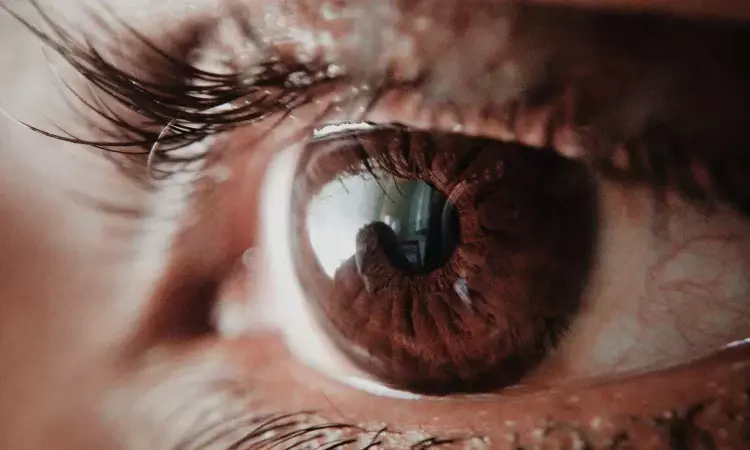- Home
- Medical news & Guidelines
- Anesthesiology
- Cardiology and CTVS
- Critical Care
- Dentistry
- Dermatology
- Diabetes and Endocrinology
- ENT
- Gastroenterology
- Medicine
- Nephrology
- Neurology
- Obstretics-Gynaecology
- Oncology
- Ophthalmology
- Orthopaedics
- Pediatrics-Neonatology
- Psychiatry
- Pulmonology
- Radiology
- Surgery
- Urology
- Laboratory Medicine
- Diet
- Nursing
- Paramedical
- Physiotherapy
- Health news
- Fact Check
- Bone Health Fact Check
- Brain Health Fact Check
- Cancer Related Fact Check
- Child Care Fact Check
- Dental and oral health fact check
- Diabetes and metabolic health fact check
- Diet and Nutrition Fact Check
- Eye and ENT Care Fact Check
- Fitness fact check
- Gut health fact check
- Heart health fact check
- Kidney health fact check
- Medical education fact check
- Men's health fact check
- Respiratory fact check
- Skin and hair care fact check
- Vaccine and Immunization fact check
- Women's health fact check
- AYUSH
- State News
- Andaman and Nicobar Islands
- Andhra Pradesh
- Arunachal Pradesh
- Assam
- Bihar
- Chandigarh
- Chattisgarh
- Dadra and Nagar Haveli
- Daman and Diu
- Delhi
- Goa
- Gujarat
- Haryana
- Himachal Pradesh
- Jammu & Kashmir
- Jharkhand
- Karnataka
- Kerala
- Ladakh
- Lakshadweep
- Madhya Pradesh
- Maharashtra
- Manipur
- Meghalaya
- Mizoram
- Nagaland
- Odisha
- Puducherry
- Punjab
- Rajasthan
- Sikkim
- Tamil Nadu
- Telangana
- Tripura
- Uttar Pradesh
- Uttrakhand
- West Bengal
- Medical Education
- Industry
Vitamin D supplementation might effectively reduce symptoms of dry eye disease, suggests study

A new study published in the recent issue of Contact Lens and Anterior Eye journal found that supplementing with vitamin D (VD) may be a useful adjuvant therapy to reduce the symptoms and indicators of dry eye.
DED is a prevalent ocular illness that affects 5 to 50% of people globally, according to estimates. Common ocular discomfort symptoms in DED include dryness, redness, a feeling of a foreign body, heaviness, light sensitivity, pain, discharge, itching, and eye strain. Also, the vitamin that has immunomodulatory and anti-inflammatory properties is vitamin D which was demonstrated by numerous studies to have a correlation between VD insufficiency and both the incidence and severity of dry eye disease (DED). In this meta-analysis, Zeying Chen and colleagues examined the symptoms and indicators of DED patients both before and after using VD supplements.
The effectiveness of VD supplement in patients with DED published up to January 2023 was searched using four clinical trials registry websites (ISRCTN, ICTRP, CT, GCP, ICH) and ten databases (Cochrane, PubMed, Web of science, Embase, Ovid, CNKI, Scopus, CSTJ, SinomedWanfang). There were 8 investigations in all, comprising a total of 439 patients. In order to determine standard mean differences (SMD) for the Schirmer's test (SH test), corneal fluorescein staining scores (CFSS, Oxford Scale, 0–5), tear film break-up time (TBUT), ocular surface disease index (OSDI), lid hyperemia, and visual analogue pain scale (VAS), two reviewers independently evaluated the quality of the literature and extracted data.
The key finding of this study was that VD supplementation was found to be effective in reducing lid hyperemia (SMD −0.71, 95% CI −1.09, −0.32, p = 0.000), OSDI (SMD −1.10, 95% CI −1.45, −0.74, p = 0.000), and tear production (SMD 1.43, 95% CI 0.81, 2.05, p = 0.000) as well as tear film stability (SMD 1.19, 95% CI 0.83, 1.55, p = 0.000).
Overall, this meta-analysis suggests that VD supplementation is an effective way to reduce several of the symptoms of DED, including lid hyperemia, TBUT, and SH test. Additionally, the subjective DED symptom score, OSDI, improved. The subgroup analysis revealed that the oral version significantly improved when compared to the buccal spray and intramuscular injection.
Reference:
Chen, Z., Zhang, C., Jiang, J., Ouyang, J., Zhang, D., Chen, T., Chu, Y., & Hu, K. (2024). The efficacy of vitamin D supplementation in dry eye disease: A systematic review and meta-analysis. In Contact Lens and Anterior Eye (p. 102169). Elsevier BV. https://doi.org/10.1016/j.clae.2024.102169
Neuroscience Masters graduate
Jacinthlyn Sylvia, a Neuroscience Master's graduate from Chennai has worked extensively in deciphering the neurobiology of cognition and motor control in aging. She also has spread-out exposure to Neurosurgery from her Bachelor’s. She is currently involved in active Neuro-Oncology research. She is an upcoming neuroscientist with a fiery passion for writing. Her news cover at Medical Dialogues feature recent discoveries and updates from the healthcare and biomedical research fields. She can be reached at editorial@medicaldialogues.in
Dr Kamal Kant Kohli-MBBS, DTCD- a chest specialist with more than 30 years of practice and a flair for writing clinical articles, Dr Kamal Kant Kohli joined Medical Dialogues as a Chief Editor of Medical News. Besides writing articles, as an editor, he proofreads and verifies all the medical content published on Medical Dialogues including those coming from journals, studies,medical conferences,guidelines etc. Email: drkohli@medicaldialogues.in. Contact no. 011-43720751


